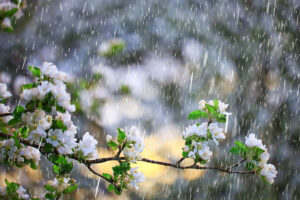Rain And Mulch
Understanding the Connection Between Rain and Mulch
 At Apollo Wood Products, we understand that mulch plays a major role in how gardens, landscapes, and play areas handle rain. In fact, many homeowners notice that rainwater changes the way mulch looks, feels, and performs. Because of this, choosing the right mulch becomes an important decision. Rain is unavoidable; however, mulch helps control how water moves through soil and around plants. When rain falls, mulch absorbs, redirects, or slows it down. Therefore, mulch works like a protective shield for soil and plant roots.
At Apollo Wood Products, we understand that mulch plays a major role in how gardens, landscapes, and play areas handle rain. In fact, many homeowners notice that rainwater changes the way mulch looks, feels, and performs. Because of this, choosing the right mulch becomes an important decision. Rain is unavoidable; however, mulch helps control how water moves through soil and around plants. When rain falls, mulch absorbs, redirects, or slows it down. Therefore, mulch works like a protective shield for soil and plant roots.
How Rain Affects Mulch
Rain interacts with mulch in several ways. To begin with, heavy rain can push lightweight mulch out of place. For example, wood chips or shredded bark may wash away if slopes are steep. Additionally, too much rain can compact mulch, which makes it harder for water to soak into the soil. On the other hand, mulch helps reduce water evaporation after rain stops. Because it holds moisture longer, plants stay hydrated even when the sun comes out. In many cases, mulch improves the balance between water retention and drainage. Consequently, soil health becomes stronger over time.
Benefits of Mulch in Rainy Conditions
Mulch has many advantages when rain is common. First of all, it prevents soil erosion. Without mulch, heavy rains can strip away valuable topsoil. Furthermore, mulch slows water movement, giving the ground more time to absorb moisture. As a result, roots receive steady hydration rather than quick bursts of water. Moreover, mulch blocks weeds from sprouting after rainfall. Since weeds thrive in wet conditions, mulch reduces their spread and protects plant beds. In addition, mulch regulates soil temperature, which proves especially helpful during cool, rainy months.
Choosing the Right Mulch for Rainy Areas
Selecting the right mulch makes a big difference. For instance, coarser mulch, such as bark nuggets, drains water quickly and resists compacting. In contrast, finer mulch, like shredded wood, absorbs more water but may hold too much if rain is constant. Therefore, it is smart to match mulch type with climate. In rainy regions, hardwood bark or larger chips often perform better. At Apollo Wood Products, we offer blends designed for different weather conditions. Because we test our products carefully, we can recommend the best options for wet seasons and long-term use.
Preventing Mulch Washout
Washout is a common concern when rain falls often. Fortunately, there are many ways to prevent it. First, spreading mulch at the correct depth helps. A two- to three-inch layer usually stays in place better. Additionally, edging around beds or using barriers stops mulch from drifting during storms. Sloped yards benefit greatly from terracing, which reduces runoff speed. Another useful method is mixing mulch sizes. When fine and coarse particles blend, they interlock and resist movement. As a result, landscapes stay tidy, stable, and protected even in heavy rains.
Rain, Mulch, and Plant Health
Plants thrive when mulch and rain work together. For example, mulch reduces the stress of fluctuating water levels. Because it holds moisture, plants avoid drying out between storms. At the same time, mulch prevents puddles that may cause root rot. With consistent soil moisture, flowers, trees, and shrubs grow stronger. Additionally, mulch provides nutrients as it naturally breaks down, further enriching the soil. Therefore, the relationship between rain and mulch directly supports long-term plant health and growth.
Mulch in Playgrounds During Rain
Apollo Wood Products also supplies mulch for playgrounds, and rain presents unique challenges in these spaces. When rainwater pools, safety becomes a major concern. However, our engineered wood fiber mulch drains quickly while still cushioning falls. In fact, ASTM-certified playground mulch keeps play areas safe even after heavy downpours. Because drainage is built into the product, children can return to play sooner. Furthermore, mulch prevents muddy surfaces, which reduces slips, falls, and unnecessary mess.
Long-Term Mulch Care After Rain
Rain eventually breaks mulch down. Over time, mulch thins, fades, and loses color. Therefore, refreshing mulch each year keeps landscapes attractive and effective. After rainy seasons, it is wise to check for bare spots. Adding a fresh layer restores coverage and improves water management. Moreover, turning mulch with a rake helps it dry out and prevents mold growth. Since Apollo Wood Products offers bulk delivery, restocking becomes simple and convenient. By maintaining mulch properly, homeowners ensure lasting protection from rain damage.
Sustainable Practices with Rain and Mulch
Mulch is not only practical but also environmentally friendly. For instance, it reduces water waste by holding rainwater in the soil. In addition, it cuts down the need for chemical weed control. Because mulch breaks down naturally, it enriches the ground without harmful additives. At Apollo Wood Products, sustainability guides how we source, blend, and produce mulch. Therefore, every bag or bulk order supports healthier gardens and greener communities. By combining rain and mulch wisely, homeowners protect their landscapes while also caring for the planet.
Why Choose Apollo Wood Products
Rain is part of nature, and mulch is one of the best tools to manage it. At Apollo Wood Products, we understand how weather shapes landscapes and play areas. Our mulch products are carefully designed to handle rain while improving soil and plant health. Furthermore, we provide expert guidance on choosing the right type and applying it effectively. Whether for gardens, slopes, or playgrounds, our mulch performs well under rainy conditions. With Apollo Wood Products, customers receive durability, safety, and sustainability in every order. Therefore, when rain meets mulch, Apollo Wood Products ensures landscapes and play spaces stay beautiful, safe, and strong.
